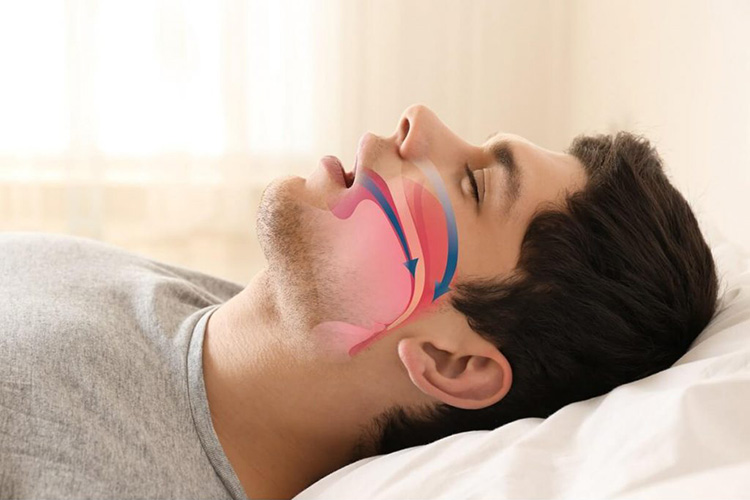Sleep apnea is a disease that causes disruption of sleep patterns, resulting from respiratory arrest during sleep. Apnea is defined as airflow falling below normal values for at least 20 seconds during sleep. Meanwhile, while the oxygen in the blood decreases, carbon dioxide increases. Sleep apnea may occur due to a problem in the nervous system or an obstruction in the respiratory system. Apnea may also occur when the two conditions coexist. The consequences of the disorder may include snoring, extreme irritability, headache in the morning, and impaired concentration. If precautions are not taken, the disease can lead to death. The majority of patients do not receive treatment because they do not care about the disease or cannot distinguish it. Pause and decrease in breathing, which recur hundreds of times during sleep, are usually noticed by the patient’s relatives. Sleep apnea, which is considered an insidious disease, requires urgent treatment. If treatment is not provided, problems such as stroke, heart attack, and irregular heartbeats may occur. However, it can cause work inefficiency, accidents and social problems in patients.
What are the symptoms of sleep apnea?
Daytime sleepiness.
Excessively loud snoring at night.
At night, interruptions in breathing, congestion and breathing disorders.
Sudden awakenings due to shortness of breath.
Acid reflux.
Don’t urinate a lot at night.
Headaches.
Loss of memory.
Treatment of Sleep Apnea
Since there are diseases that resemble this disease and show similar symptoms, the diagnosis must be made accurately and precisely. The definitive diagnosis of sleep apnea is measured in the laboratory with a technique called a sleep study. An examination called polygraphic examination must be performed in a laboratory environment. In this examination, parameters during sleep are recorded. Brain activities, sleep quality, structure and disorders are examined in a healthy way. The patient’s breathing movements, amount of oxygen during sleep, heart rhythms and ECG are recorded and body functions are examined. If treatment is required as a result of the tests, treatment is started immediately. If the inflammation is caused by anatomical disorders, prosthesis, surgical methods or drug treatments are applied. Patients are made to use devices that support breathing during sleep. These devices help patients sleep regularly by regulating breathing.
What Should Ideal Sleep Be Like?
When we say sleep, first of all it is essential for a balanced and regular life. During sleep, the body rests, cleans itself, purifies, repairs, rebuilds, grows and heals itself. During sleep, stress, tension and irritability accumulated throughout the day are released and easily released from the body. To some extent, this tension and stress is also resolved in our dreams. Thus, the importance of sleep comes to the fore for our mental health. Of course, sleep is important not only for our mental health but also for our physical health. Because insufficient and poor quality sleep weakens the body and causes various diseases.
What is REM Sleep?
In the 2nd phase of slow wave sleep, sleep; There are changes in sleep depth and body functions. Depending on the depth of sleep, muscle tone decreases and rapid eye movements begin. REM, which consists of the first letters of these words in English, is discussed as a sleep phase. REM phase or REM sleep occurs in the 2nd phase of slow wave sleep. In this phase, the person can only be awakened by deep sleep phase stimulants. EEG features are also similar to phase 2. This similarity is at odds with phase 2 slow wave sleep. Because of this contradiction, we call REM sleep paradoxical or desingronized sleep. All other sleep phases are also designated as non-REM. The REM sleep phase is repeated every 90 minutes during normal sleep. The average duration is around 20-30 minutes. This time may be even longer.
For a Quality Sleep
Make it a habit to sleep and wake up at the same time every day.
Be in bright environments as much as possible during the day.
Take a little walk in the morning before you start working. You can walk to work. The average daily walking time should not be shorter than 45 minutes.
Limit your caffeine intake such as coffee, tea, chocolate, etc. Do not drink more than 2 cups of coffee a day. If you have trouble falling or staying asleep, eliminate caffeine completely.
If you smoke, reduce your smoking. If you have trouble sleeping, try to quit smoking 100 percent.
Limit alcohol intake. If you have trouble sleeping, avoid alcoholic beverages completely.
If you feel sleepy, you can sleep for short periods of time during the day, but if you have insomnia at night, you should not sleep during the day.
Never use your bedroom for purposes other than sleeping and having sex. You should not use your bedroom as a study room.
Your bedroom should be in conditions that will make you comfortable in terms of heat, light and noise.

